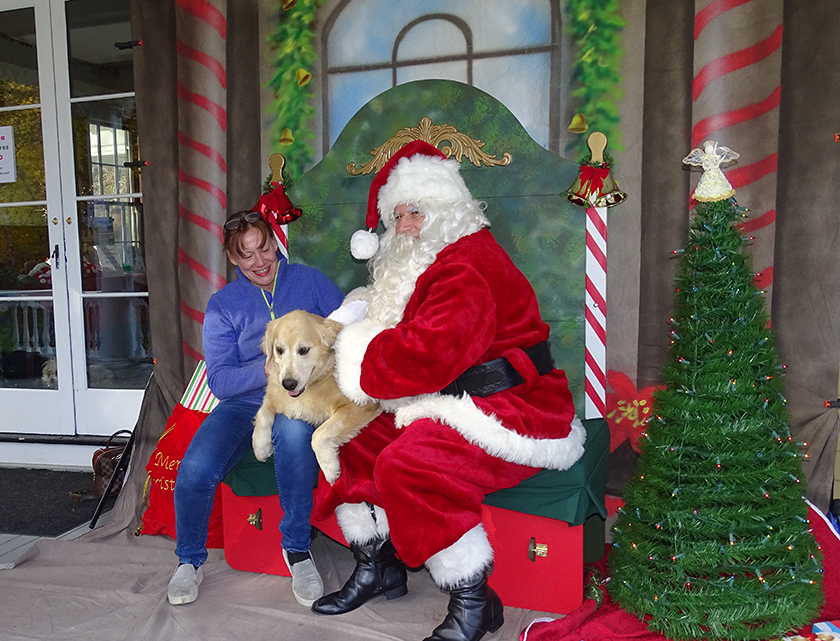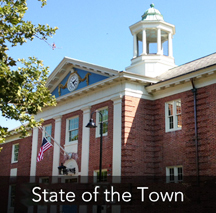Correction
 A November 14 article headlined “Benefits and hurdles for solar array at landfill discussed” used an incorrect abbreviation when saying that a solar array at the transfer station could have “a capacity of 1.4 mW” (milliwatts). It should have said “a capacity of 1.4 MW” (megawatts). The original article has bene edited to reflect this correction.
A November 14 article headlined “Benefits and hurdles for solar array at landfill discussed” used an incorrect abbreviation when saying that a solar array at the transfer station could have “a capacity of 1.4 mW” (milliwatts). It should have said “a capacity of 1.4 MW” (megawatts). The original article has bene edited to reflect this correction.
Benefits and hurdles for solar array at landfill discussed
 A report by the Solar PV Working Group concluded that the best site for a municipal solar photovoltaic array is the capped town landfill, with the roof of the public safety building coming in second.
A report by the Solar PV Working Group concluded that the best site for a municipal solar photovoltaic array is the capped town landfill, with the roof of the public safety building coming in second.
Solar Design Associates, a consulting firm hired by the solar working group, looked at 25 potential sites in town. A solar array at the transfer station could have a capacity of 1.4 MW, while a roof-mounted array on the public safety building could generate 58.6 kW. Selectman Renel Fredriksen summarized the report at the November 12 State of the Town meeting and said the group hoped to have a proposal to vote on at Town Meeting in March.
If and when a site is selected, the town would sign an agreement with a private firm to purchase, install and maintain the solar PV equipment, and in return, the town would receive lease payments and/or reduced electricity costs. In a 2015 report, BlueWave Capital said a solar installation on the landfill site could produce more than 50 percent of Lincoln’s municipal electricity.
One problem, though: the landfill is now designated as conservation land, and state law requires that if the town wants to open it to solar use, it must designate another parcel of the same size to offset the loss to the town’s inventory of conservation land. Officials had hoped that part of the Hargreaves-Heald property purchased by the town earlier this year could be used for this purpose, but the state has since said that this was not acceptable.
Removing land from conservation status requires unanimous approval by the Conservation Commission and two-thirds majority votes by Town Meeting and the state legislature.
The town and Minute Man National Historic Park would also have to renegotiate the easement given by the park to the town for access from Route 2A to the landfill. There is a “polite disagreement” with the park about what uses are permitted by that easement, “but once have a concrete proposal, we’ll resume that conversation,” Town Administrator Tim Higgins said.
Once a Lincoln School project is underway, the Ballfield Road campus is promising site for a future municipal solar PV array, as is the soon-to-be-rebuilt Minuteman High School, Fredriksen noted.
In the meantime, “there’s lots that we can do now to to change our electricity use, like getting a home energy assessments or buying more renewable energy,” said Green Energy Committee member Sue Klem, adding that residences account for 80 percent of electricity energy in town.
Small-scale agriculture expansion discussed at SOTT
 Opportunities for small-scale commercial raising of animals and sale of animal products will be expanded if residents approve a zoning bylaw change at Town Meeting in March.
Opportunities for small-scale commercial raising of animals and sale of animal products will be expanded if residents approve a zoning bylaw change at Town Meeting in March.
Current rules under the 2011 Right to Farm bylaw allow property owners to sell produce and flowers on lots of any size, but animal products such as meat, dairy, eggs, wool, honey, etc., may not be sold on parcels of less than five acres, and animals may be kept only for personal use on those parcels.
Allowing sales from smaller-scale farming would be “consistent with common agricultural practices in Lincoln” and would “help feed the community and offer valuable skills to young people to keep agriculture flourishing,” Agricultural Commission co-chair Ari Kurtz explained at the State of the Town meeting on November 12.
There are currently more than 16 active farms on 500 acres of agricultural land in Lincoln.
The changes would impose a small-agriculture minimum lot size of 80,000 square feet (a bit under two acres) and allow annual sales of no more than $5,000. The maximum number of “animal units” permitted would be one per acre. An animal unit is defined as one 1,000-pound cow, five goats or sheep, two pigs, 30 fowl or 20 rabbits (bees would be limited by gross sales rather than number of insects). The revised bylaw would also add requirements and definitions for best management practices for handling livestock and manure.
Anyone who felt their neighbor was in violation of the rules could complain to the Board of Health, Kurtz and AgComm co-chair Lynne Bower said. Prospective small-scale farmers would not have to request a special permit, but submitting a simple application to the town’s building inspector is “worth exploring,” Kurtz said.
Although agricultural land is taxed a a lower rate than residential property, there will be no tax implications because, by state law, parcels under five acres may not be classified as agricultural, Kurtz said. The change wouldn’t itself open to the door to marijuana cultivation because selling marijuana will also require a state license and permit, he added.
In response to a question about the $5,000 annual earnings limit, Kurtz and Bower said the number was “just a stab in the dark” and could either be revisited periodically, or indexed to another figure that increases over time.
News acorns
How to talk to kids about the election
Licensed psychologist and Lincoln resident/parent Cris Ratiner will lead a conversation on “How to Talk with Your Children About the Election and Its Aftermath” on Tuesday, Nov. 15 at 6:30 p.m. in the Hartwell multipurpose room. Ratiner has worked with parents and families in ordinary times as well as extraordinary times (9/11, Hurricane Katrina, the Boxing Day tsunami). Anyone with questions may email her at crisratinerphd@gmail.com.
Second open space forum on Wednesday
The second community forum for the Open Space and Recreation Plan update takes place on Wednesday, Nov. 16 at 7 p.m. in the Town Hall Donaldson Room. The group is in the final phase of community outreach and goal setting (see the Lincoln Squirrel, July 20, 2016).
‘How to Succeed In Business Without Really Trying’
LSB Players, the theater production company of Lincoln-Sudbury Regional High School, presents How to Succeed In Business Without Really Trying on November 16, 17, 18 and 19 at 7:30 p.m. in the high school’s Kirschner Auditorium. The musical traces the journey of J. Pierrepont Finch as he follows a guide that instructs him on how to rise to the top of the corporate world on charm and cunning alone. This hilarious satire is based on an actual book by Shepherd Mead, and is a clever, tongue-in-cheek send-up of corporate life featuring familiar songs by Frank Loesser like I Believe in You, The Brotherhood of Man and Been A Long Day. Tickets are $15 for adults and $8 for senior citizens/students. Click here to reserve tickets.
Talk on Israel/Palestine nonviolence
Sheila H. Katz, Professor of Middle East History at Berklee College, will present “Connecting with the Enemy: A Century of Palestinian-Israeli Joint Nonviolence” on Monday, Nov. 21 at 7 p.m. in the Lincoln Public Library. The talk presents the first comprehensive history of grassroots nonviolent alternatives to the lethal collision of the two national movements despite condemnation by their own societies, repetitive diplomatic failures, harsh inequalities, and endemic cycles of violence. Presented by the GRALTA Foundation (Grass Roots Awareness, Learning, Travel and Action), which is also organizing an Israel-Palestine study tour from Jan. 4-14, 2017. For more information, call Steve and Barbara Low at 781-259-1300.
Lincoln seniors invited to dinner next Wednesday
Lincoln-Sudbury Regional High School warmly invites Lincoln senior citizens to a Thanksgiving dinner at the school on Wednesday, Nov. 23 at noon, complete with performances by the L-S Jazz Band and dancers. Please call the Council on Aging at 781-259-8811 to sign up.
‘Gratitude Trees and Campfire’ at Farrington Nature Linc
Start your Thanksgiving holiday with an evening focused on thankfulness and time spent in nature at Farrington Nature Linc on Wednesday, Nov. 23 from 6:30-8:30 p.m. During the “Gratitude Trees and Campfire” program, families can decorate preserved leaves to create a beautiful gratitude tree to take home, make leaf-inspired table art, listen to stories around the campfire and eat s’mores. Registration is required; call or email Program Director Brianne at brianne@naturelinc.org or 978-764-9186. Suggested donation: $10/person. Farrington Nature Linc is at 295 Cambridge Turnpike (Route 2 eastbound) directly after Gerard’s Farm Stand.
Thanksgiving night contra dance
Lincolnites are invited to a Thanksgiving Night contra dance on Thursday, Nov. 24 from 7-10 p.m. in the Smith School gym featuring musicians Larry Unger and Julie Metcalf, and caller Chris Ricciotti. All ages and abilities are welcome. Tickets are $6 for adults and students, $4 for children 10 and under. Sponsored by the First Parish Church. For more information, call 781-259-0692 or email kwinchell@comcast.net.
Santa paws (Lincoln Through the Lens)

Allison Tobia of Wayland and her golden retriever Penny get their photo taken with Santa at Saturday’s Paws for the Holidays Festival at the Pierce House hosted by Lincoln-based Phinney’s Friends. (Photo: Alice Waugh)
Readers may submit photos for consideration for Lincoln Through the Lens by emailing them to lincolnsquirrelnews@gmail.com. If your photo is published, you’ll receive credit in the Squirrel. Photos must be taken in Lincoln and include the date, location, and names of any people who are identifiable in the photo. Previously published photos can be viewed on the Lincoln Through the Lens page of the Lincoln Squirrel.
Traffic remedies discussed at State of the Town
 (Editor’s note: there will be more coverage of the State of the Town discussions tomorrow.)
(Editor’s note: there will be more coverage of the State of the Town discussions tomorrow.)
At Saturday’s State of the Town meeting, residents shared their thoughts about speed limits, distracted drivers, dangers for bicyclists and other roadway issues, though there seemed to be more problems than immediate solutions.
Selectman Peter Braun voiced what everyone has noticed: there’s more traffic all over town especially at rush hour, because GPS has revealed commuter shortcuts through town to more people. He and other officials also reminded residents that many issues such as area-wide traffic and making changes to state roads like Routes 117 and 126 are largely out of Lincoln’s control.
Several measures have been tried to slow and reduce traffic, such as speed bumps and updating signage. There were speed bumps on Lincoln Road at one time but there were removed, and their drawbacks—traffic noise from accelerating cars, and safety issues for emergency vehicles and snow plows—outweigh their benefits, said Braun and Chief of Police Kevin Kennedy.
Changing signage has been somewhat more effective, especially at Five Corners, where stop signs were recently realigned. Sight lines have also been improved at Route 117 and Lincoln Road, but both intersections are still problematic, residents noted.
Reducing speed limits can also have unintended consequences. To change the speed limit on a road, a town must apply to the state, and the new speed limit must be close to the speed at which 85 percent of the motorists already travel on it under normal conditions—something that could actually result in the speed limit going up, Kennedy noted.
“The best way to control speed is volume. It’s one of those double-edged sword things,” Braun said.
When roads are repaved, the shoulder is usually widened a bit, though trees and utility poles often limit how much can be done. But again, there are pros and cons. “Narrower roads serve as effective traffic-calming mechanism but can make it difficult for cyclists,” Town Administrator Tim Higgins said.
Other proposals that were discussed:
Increased enforcement of existing speed limits—this requires hiring more police officers. Braun rhetorically asked if residents would support a Proposition 2½ override to fund such a measure and was met mostly with silence.
Crosswalks—“They can give a false sense of security… we’ve kind of shied away from them,” Braun said.
Roundabouts at difficult intersections—this has been considered, even to the point of having a traffic engineer sketch out some possibilities, but roundabouts are costly, and the town usually doesn’t own enough land adjacent to the intersection to make this feasible, Higgins said.
Restricting access to smaller roads to reduce commuter cut-throughs—one resident objected that “this is a zero-sum game; if you close a road in one place, you increase traffic in another. Don’t change the policy of letting one neighborhood have less traffic than another.”
Other suggestions to improve safety seemed more promising, such as free-standing speed sensors that blink or flash a warning message if approaching drivers are going too fast, or banning cellphone use while driving in Lincoln. Rhode Island, Connecticut, New Hampshire and Vermont already have state laws requiring cell phones in cars to be hands-free, though Massachusetts failed to pass a similar law over the summer.
The town has gotten a Complete Streets state grant to study and identify specific roadway and path improvements, with the chance to apply for a larger grant for any construction projects that can be completed by June 30, 2017. However, even projects that can’t get done in that timeframe can go on a “wish list” to be considered later for town-only funding, Braun noted.
Officials urged everyone to complete a Complete Streets online survey. There will be a presentation and discussion of ideas on Wednesday, Dec. 7 at 7:30 p.m. in the Town Hall’s Donaldson Room. Officials also encouraged anyone with comments or suggestions about specific roadway and traffic issues to contact Higgins at higginst@lincolntown.org.
Letter to the editor: Gallagher Tully thanks citizens
To the editor:
It was a great honor and privilege to have my name placed on the ballot. I introduced myself (Stacey Gallagher Tully, candidate for State Representative for the 9th Middlesex District) thousands of times, but it never got old. In fact, it was energizing and refreshing.
Meeting so many great people and families—the hearts of our communities—along the campaign trail was extremely rewarding. I was humbled each and every day by the outpouring of support from so many different corners of the 9th district. Engaging conversations with so many people at their doors, at community events, in local grocery stores—sharing personal stories and ideas and concerns—was the highlight of this campaign.
To my volunteers, an outstanding team of hard workers, you offered and gave of your time, talent and treasure to support this campaign. I want to publicly thank you. You are my heroes and I continue to be inspired by your passion and commitment to better government through conservative principles.
Onward and Upward, Lincoln and Waltham for today is a bright new day. This is not the end, it is just the beginning of my public service in the capacity of a candidate. “If your dreams don’t scare you, they’re not big enough.”
Sincerely,
Stacey Gallagher Tully
85 Lincoln Road, Waltham
Letters to the editor must be signed with the writer’s name and street address and sent via email to lincolnsquirrelnews@gmail.com. Letters will be edited for punctuation, spelling, style, etc., and will be published at the discretion of the editor. Letters containing personal attacks, errors of fact or other inappropriate material will not be published.
Final election results show Lincoln voted ‘yes’ on Question 2
A more complete (though still unofficial) tally of Lincoln’s election results shows that Lincolnites voted in favor of expanding charter schools—and was one of very few Massachusetts cities and towns to do so.
Preliminary results that were sent to the Squirrel on Tuesday night contained a typographical error in the results for Question 2 that seemed to indicate Lincolnites voted against raising the cap on charter schools. In fact, Lincoln voted by a margin of 1,988–1,768 to raise the cap, and was one of only 15 towns to vote yes. The others were Weston, Wellesley, Dover, Sherborn, Manchester, Mt. Washington, Cohasset, Chatham, Orleans, Nantucket, and four of the five towns on Martha’s Vineyard.
The next-closest margin for a ballot question in Lincoln was the vote of 2,018–1,765 in favor of legalizing recreational marijuana.
The tables below show results by voting precinct, excluding blanks and write-ins. Click here to see a map showing the two Lincoln precincts.
| Candidates | Precinct 1 | Precinct 2 | Total |
|---|---|---|---|
| PRESIDENT and VP | |||
| Clinton and Kaine | 1,820 | 1,086 | 2,906 |
| Trump and Pence | 328 | 285 | 613 |
| Johnson and Weld | 97 | 78 | 175 |
| Stein and Baraka | 24 | 23 | 47 |
| U.S. REPRESENTATIVE | |||
| Katherine Clark | 1,848 | 1,166 | 3,014 |
| COUNCILLOR | |||
| Marilyn Devaney | 1,681 | 1,065 | 2,746 |
| STATE SENATOR | |||
| Michael Barrett | 1,722 | 1,097 | 2,819 |
| STATE REPRESENTATIVE | |||
| Thomas Stanley | 1,332 | 783 | 2,115 |
| Stacey Gallagher Tully | 643 | 533 | 1,176 |
| SHERIFF | |||
| Peter Koutoujian | 1,733 | 1,092 | 2,825 |
| BALLOT QUESTIONS | Precinct 1 | Precinct 2 | Total |
|---|---|---|---|
| QUESTION 1: Additional slot parlor license? | |||
| Yes | 392 | 334 | 726 |
| No | 1,832 | 1,128 | 2,960 |
| QUESTION 2: Allow up to 12 new charter schools per year? | |||
| Yes | 1,186 | 802 | 1,988 |
| No | 1,089 | 679 | 1,768 |
| QUESTION 3: Prohibit confinement of farm animals? | |||
| Yes | 1,841 | 1,180 | 3,021 |
| No | 443 | 304 | 747 |
| QUESTION 4: Legalize recreational marijuana? | |||
| Yes | 1,186 | 832 | 2,018 |
| No | 1,106 | 659 | 1,765 |
Letter to the editor: an important conversation about Town Meeting
To the editor:
On Saturday, the town will have an opportunity to come together and hear what is on the minds of town boards and committees, in addition to asking questions and sharing ideas. That is one important conversation. There is another.
This past summer, an important community conversation was resumed. Every so many years, a new generation of Lincoln looks at itself and asks important questions about our decision making process: Town Meeting. Some clearly feel the format is not conducive to inclusion. Others believe it brings out the best of community participation and decision-making. And, as many have said, democracy is not a spectator sport and requires full participation.
But how do we best achieve that when we have a form of governance crafted in the 18th century that is still serving us in the 21st? Are there ways we can improve access to information, debate and decision-making to expand participation? The Town Moderator, an elected position established in the 18th century, stepped to the plate and took these and other questions to the Board of Selectmen on October 24. The conversation’s focus was to explore how we might improve Town Meeting and decision-making. After some discussion, the Selectmen agreed that having a town-wide conversation about fine-tuning Town Meeting was important and urged the moderator to consider how best to move forward.
Other models for Town Meeting exist so that we need not reinvent the wheel. We have neighbors who debate this issue on a regular basis. Years ago, HATS (Hanscom Area Towns—Lincoln, Lexington, Concord and Bedford) hosted just such a discussion. In attendance were other Town Moderators, representatives of the League of Women Voters, Town Meeting members and others. Many towns have created a guide to Town Meeting for their own communities. Our own Town Clerk has created such a guide: “Welcome to Lincoln! A Guide for New Residents.” This is being distributed to newcomers and will soon made available online.
But what more can we do? How can we include new ideas, technologies and innovations? What became clear in the meeting between the Selectmen and Town Moderator is a need for the setting of context to open any discussion:
- What exactly is Town Meeting?
- Where did it come from and why?
- What are the state statutes that establish it, and that also dictate how decisions are made?
- What can and what can’t we do to alter voting and decision-making?
- And, if we want to make fundamental changes to how we govern ourselves, what would it take to do so?
Once we have established the basic information and “road rules,” we can then begin a discussion of how we might make changes. While no date was set for the Town Moderator to return to the Selectmen to report next steps, it is clear that there is a need, and an important conversation has begun.
Many of us wonder how we, as a clearly divided country, can come together to govern at a national level. But we should not doubt that we can and will come together as a community. It is important to find time to listen and share thoughts this Saturday morning at our annual State of the Town meeting, and also to participate when and where we might find an opportunity to discuss how best to fine-tune Town Meeting, and celebrate the civility that has dominated our ongoing community conversations.
Sincerely,
Sara Mattes
71 Conant Rd.
Letters to the editor must be signed with the writer’s name and street address and sent via email to lincolnsquirrelnews@gmail.com. Letters will be edited for punctuation, spelling, style, etc., and will be published at the discretion of the editor. Letters containing personal attacks, errors of fact or other inappropriate material will not be published.


